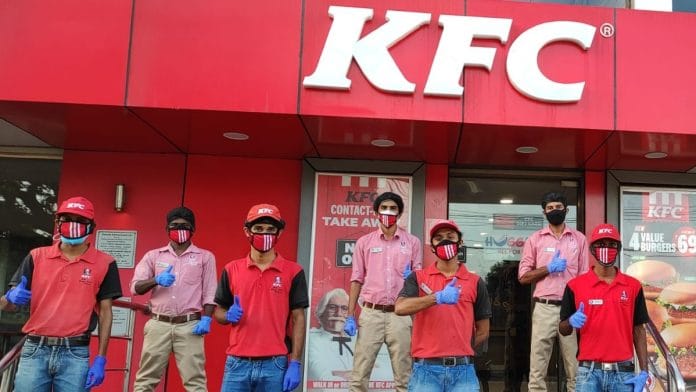New Delhi: Can a company claim exclusive rights over something as generic as “Fried Chicken”? That’s the central question at the heart of an ongoing trademark dispute in India involving Kentucky Fried Chicken (KFC). From going after a small outlet named Ali Fried Chicken in 2024 to challenging Nashville Fried Chicken in 2025, the fast food giant’s aggressive legal actions point to its attempt to expand the protective scope of its brand.
In 2024, in the Ali Fried Chicken case, the Delhi High Court ruled in KFC’s favour, restraining the local outlet from using the name. KFC argued that the name was deceptively similar to “Kentucky Fried Chicken” and could mislead consumers by capitalising on the brand’s reputation.
The court recognised “Kentucky Fried Chicken” as a “well-known trademark” under Indian law and ordered that Ali Fried Chicken cease operations under that name.
This decision reinforced the idea that even when a phrase contains generic words, its overall impression could still infringe on a globally established brand.
Cut to this May, 2025, KFC has taken a similar stance against Massive Restaurants Private Limited, the parent company that owns popular food chains like Farzi Cafe, Pa Pa Ya, Masala Library, Louis Burger and the Nashville Fried Chicken (NFC).
KFC has filed a rectification application and a civil suit in the Delhi High Court to oppose Massive Restaurants’ move to trademark the NFC brand name. The global fast-food giant argues that “Nashville Fried Chicken” bears deceptive similarity to “Kentucky Fried Chicken” and could confuse consumers. Massive Restaurants is yet to publicly respond.
Both the Ali Fried Chicken and Nashville Fried Chicken cases underscore the same legal question: whether KFC can assert exclusive rights over the use of the phrase ‘Fried Chicken’ in commercial branding—a term that KFC argues becomes distinctive in the context of its globally recognised name.
KFC entered the Indian market in 1995 with its first outlet in Bangalore and now operates over 600 outlets across the country. Its famous red-and-white branding, the image of Colonel Sanders, and its slogans have become widely recognised, especially in urban centres. The company’s success in India has also made it more vigilant about protecting its brand from lookalikes and imitators in a competitive and growing fast-food market.
Under Indian law, Section 2(1)(zg) of the Trade Marks Act, 1999, defines a “well-known trademark” as one that is widely recognised by the public. If another party uses a similar name for unrelated products or services, it could create confusion among consumers. Courts have increasingly upheld this principle to protect global brands with deep consumer associations, like KFC.
ThePrint examines KFC’s long-standing history of trademark litigation. Over the years, it has consistently turned to courts to protect its name, slogans, and product identifiers.
Defending the ‘Original Recipe’
One of KFC’s most high-profile recent legal actions was filed in November 2024 against Church’s Texas Chicken in the US, over the phrase “Original Recipe”.
KFC claimed it had been using the phrase since 1972 to market its proprietary blend of 11 herbs and spices. The company alleged that Church’s Texas Chicken’s use of the same phrase could mislead customers and dilute KFC’s brand.
In December 2024, KFC voluntarily dropped the case without prejudice, leaving open the option to refile in the future. No official reason or settlement details were disclosed.
The Chicken Zinger Ruling
In another key decision, Delhi High Court ruled in February 2023 that KFC could not claim exclusive rights over the word “Chicken” in its attempt to trademark “Chicken Zinger”.
While the court acknowledged KFC’s existing trademarks over “Zinger” and “Paneer Zinger,” it found that the word “Chicken” was generic and descriptive. The court allowed the registration of “Chicken Zinger” under Class 29 of the Act (covering meat and poultry products), but clarified that KFC would not have a monopoly over the term “Chicken” itself.
“Finger Lickin’ Good” also guarded
KFC’s brand power goes beyond just names. Its iconic slogan, “Finger Lickin’ Good,” registered as a trademark in the 1960s, has also been a focus of enforcement.
In 2017, KFC filed a lawsuit against Brian Mastrosimone in the US, alleging infringement of the slogan, which it described as one of its most valuable trademarks. KFC petitioned Mastrosimone claiming that he adopted the trademarks based purely on the goodwill associated with KFC, and argued that his slogans are either misleading or likely to confuse consumers by creating a “similar commercial impression”.
Perhaps no element of the KFC brand is more closely guarded than its “Original Recipe”.
Developed by Colonel Harland Sanders in the 1930s, the secret blend is kept locked in a safe at the company’s Louisville headquarters, USA. To prevent any one person or supplier from knowing the full formula, the blend is split between two manufacturers. In 1999, a couple who bought Sanders’s former home claimed to have discovered a handwritten version of the recipe. While KFC considered legal action to prevent its sale, it eventually dropped the matter, stating the note did not match the original formula.
Ruchi Bhattar is an intern who graduated from ThePrint School of Journalism.
(Edited by Kartikay Chaturvedi)






